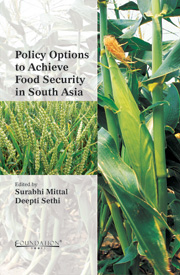Book contents
- Frontmatter
- Contents
- List of Contributors
- Foreword
- Acknowledgements
- List of Abbreviations
- 1 Food Security in South Asia
- 2 Food Security in India: Policies and Options
- 3 Multiple Facets of Food (In) Security in Sri Lanka: An Input to Food Policy
- 4 Food Security in Bangladesh: Achievements, Challenges and Way Forward
- 5 State of Agriculture and Food Security in Pakistan
- 6 Food Security Situation in Nepal: Issues and Suggested Policy Measures
- 7 Food Security in Maldives
- 8 Role of Regional Trade and Rural Development for Food Security in Bhutan
- 9 Food Security in Afghanistan
3 - Multiple Facets of Food (In) Security in Sri Lanka: An Input to Food Policy
Published online by Cambridge University Press: 05 June 2012
- Frontmatter
- Contents
- List of Contributors
- Foreword
- Acknowledgements
- List of Abbreviations
- 1 Food Security in South Asia
- 2 Food Security in India: Policies and Options
- 3 Multiple Facets of Food (In) Security in Sri Lanka: An Input to Food Policy
- 4 Food Security in Bangladesh: Achievements, Challenges and Way Forward
- 5 State of Agriculture and Food Security in Pakistan
- 6 Food Security Situation in Nepal: Issues and Suggested Policy Measures
- 7 Food Security in Maldives
- 8 Role of Regional Trade and Rural Development for Food Security in Bhutan
- 9 Food Security in Afghanistan
Summary
Introduction
Sri Lanka is an island country in South Asia. It is the fifty-third most populated nation in the world and home to around 19 million people with an annual population growth rate of 0.79 per cent. The major economic sectors of the country are tourism, tea export, apparel, textile and rice production. In addition to these sectors, overseas remittances contribute significantly to foreign exchange of Sri Lanka.
After opening up its markets in late 1970s, the country has witnessed robust economic growth despite several adverse shocks like tsunami, oil, food price increases, and increased competition for its apparel exports following the end of the multi-fiber arrangement. The growth rate of Sri Lanka averaged around 5 per cent during 1980s and 1990s, and has been above 6.5 per cent since 2004. Despite its highly-educated population, the economic growth of the country has been constrained by three decades of internal conflicts. In recent years, the prevailing conflict and the frequency of droughts, floods and landslides have reduced people's access to food. According to FAO 2009, Sri Lanka is classified as low income and food deficit country.
Sri Lanka has been a net food importer since the time of the British colonial rule prior to 1948 and has consequently been affected by developments in the global food market. The efforts to decrease the dependence on imports and increase production mainly for rice have been only partially successful because of high population growth.
Information
- Type
- Chapter
- Information
- Policy Options to Achieve Food Security in South Asia , pp. 51 - 76Publisher: Foundation BooksPrint publication year: 2011
Accessibility standard: Unknown
Why this information is here
This section outlines the accessibility features of this content - including support for screen readers, full keyboard navigation and high-contrast display options. This may not be relevant for you.Accessibility Information
- 2
- Cited by
